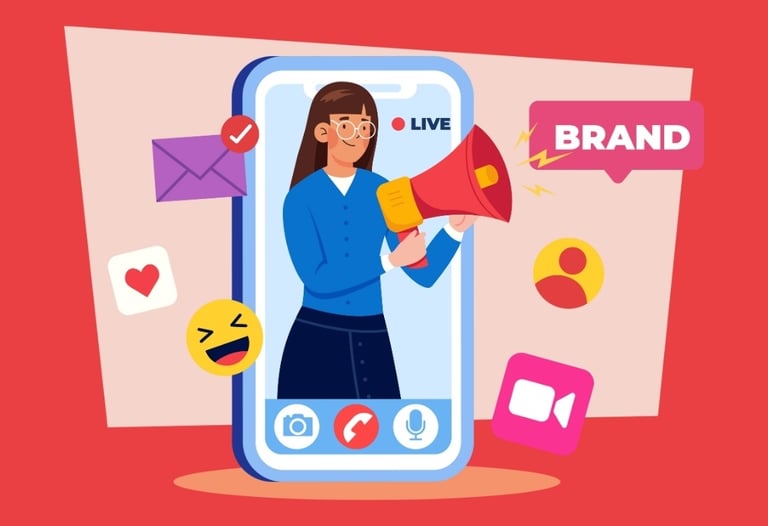How to Create Digital Campaigns That Sell
Lessons for the Modern Marketer
TeamBrandchitect
3/31/20253 min read


How to Create Digital Campaigns That Sell: Lessons for the Modern Marketer
Marketers are constantly chasing the next big trend or platform in today's fast-paced digital landscape. Yet amid this technological whirlwind, the fundamental principles of what makes people buy remain remarkably consistent. The most successful digital campaigns aren't just technically sophisticated but psychologically savvy.
This guide explores how time-tested marketing wisdom applies to modern digital campaigns, helping consultancies and marketers create work that doesn't just impress—it sells.
The Research Imperative:
Know Your Audience Better Than They Know Themselves The Data-Insight Connection
Before launching any digital campaign, exhaustive research is non-negotiable. Modern marketers have access to unprecedented amounts of data, but information alone doesn't create compelling campaigns—insights do.
Your digital strategy should begin with deep audience analysis:
● Behavioral data: What actions do your prospects take online? Which content formats engage them the longest?
● Demographic and psychographic profiles: Who are they beyond basic statistics? What values drive their decisions?
● Customer journey mapping: What touchpoints matter most in their decision process?
● Search intent analysis: What specific language do they use when seeking solutions?
Research isn't just preliminary work—it's the foundation for all effective digital campaigns. As the advertising legend himself might say: "Advertising people who ignore research are as dangerous as generals who ignore decodes of enemy signals."
The Big Idea:
Creating Digital Campaigns with Stopping Power Standing Out in the Attention Economy
The average consumer now sees thousands of marketing messages daily. How will yours cut through?
The answer lies in developing what can only be called "The Big Idea" a central, compelling concept that makes your campaign impossible to ignore. In digital marketing, your big idea must:
Command attention within seconds (often just a thumb-scroll away from being forgotten)
Communicate a unique value proposition clearly and memorably
Connect emotionally with your target audience
Convert interest into specific actions
Headlines That Stop the Scroll:
Digital Copywriting That Demands Attention Crafting Irresistible Digital Headlines
In digital marketing, your headline often determines whether your entire campaign succeeds or fails. On average, 80% of people will read your headline, but only 20% will continue to your content.
Effective digital headlines should:
● Promise a specific benefit that matters to your audience
● Trigger curiosity without resorting to clickbait
● Create urgency when appropriate
● Speak directly to search intent (incorporating keywords naturally)
● Be precisely scannable on mobile devices
Examples of strong digital headlines that follow these principles:
● "5 Data-Driven Strategies That Increased Our Client's Conversion Rate by 137%"
● "Why Your Competitors' Social Media Strategy Is Outperforming Yours (And How to Fix It)"
● "The 15-Minute Website Audit That Identified $45,000 in Lost Revenue Opportunities"
The Power of Specifics:
Building Digital Credibility Through Detail
Why Vague Claims Fall Flat Online
In the digital realm, where skepticism runs high, generic claims are the death of persuasion. Modern consumers have developed sophisticated filters for marketing hyperbole.
To build credibility:
● Replace "increases conversions" with "increased conversions by 27% within 60 days"
● Swap "improves user experience" for "reduced bounce rate from 65% to 32% across mobile devices"
● Transform "saves time" into "automates 7 hours of weekly reporting tasks"
This specificity does more than build trust—it shows precisely what success looks like, making your offering more tangible and desirable.
Facts Tell, Stories Sell:
Narrative-Driven Digital Content Creating Emotional Connections in the Digital Space
While data drives decisions, stories drive action. The most successful digital campaigns weave compelling narratives that position the customer—not your brand—as the hero.
Effective digital storytelling includes:
● Customer-centered narratives: Stories that reflect your audience's challenges and aspirations
● Before-and-after frameworks: Clear illustrations of transformation
● Micro-narratives: Brief, powerful stories optimized for digital attention spans
● Visual storytelling: Using multimedia elements to enhance narrative impact
● Sequential storytelling: Stories that unfold across multiple touchpoints
Case studies, customer testimonials, and behind-the-scenes content are particularly effective vehicles for digital storytelling that drive conversion.
The Long Copy Principle:
Why Detailed Content Still Converts
When More Is More in Digital Marketing
Conventional wisdom suggests digital content should always be brief. The data tells a different story. For complex offerings or high-consideration purchases, comprehensive content consistently outperforms shorter alternatives in conversion metrics.
Long-form digital content works when it:
● Anticipates and answers all prospect objections
● Builds perceived value through a detailed explanation
● Demonstrates a thorough understanding of the problem
● Establishes authoritative expertise
● Provides multiple entry points for different audience segments
The Testing Imperative: Creating a Culture of Continuous Improvement
Why Digital Marketing Demands Ongoing Experimentation
Perhaps the greatest advantage of digital marketing is its measurability. Every element of your campaign can be tested, optimized, and improved:
● A/B testing headlines and CTAs to identify highest-performing variants
● Multivariate testing landing pages to determine optimal layouts
● Channel testing to identify where your audience is most responsive
● Message testing to refine your value proposition
● Timing tests to determine optimal deployment schedules
Establish a rigorous testing framework with clear hypotheses, controlled variables, and significant sample sizes. Let data, not opinion, guide your decisions.
Conclusion: The Discipline of Effective Digital Marketing
Creating digital campaigns that sell isn't about chasing trends—it's about applying timeless principles of persuasion through modern channels. Research thoroughly, develop big ideas, craft compelling headlines, use specific claims, tell powerful stories, provide comprehensive information when appropriate, and test relentlessly.
When technology changes but human psychology remains constant, the marketers who understand both will create campaigns that don't just impress—they sell.
Copyright@2025 | EQUIPE BRANDCHITECT PRIVATE LIMITED
